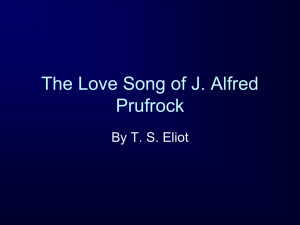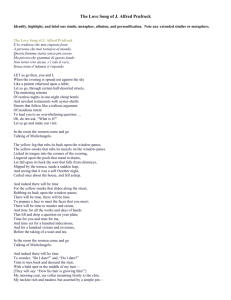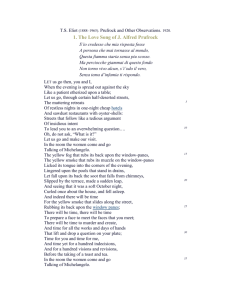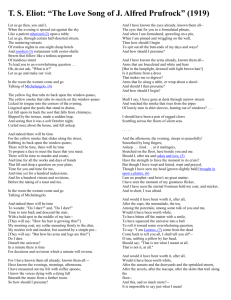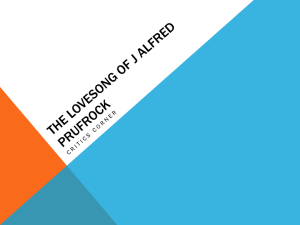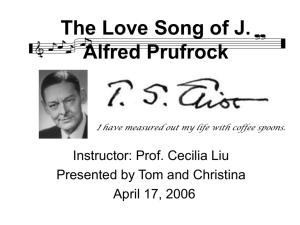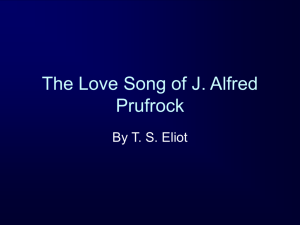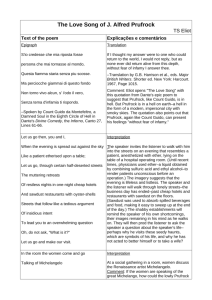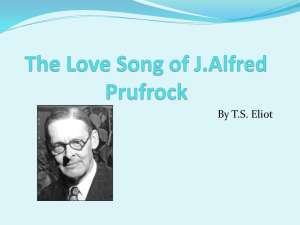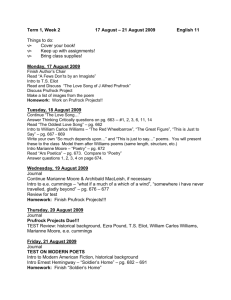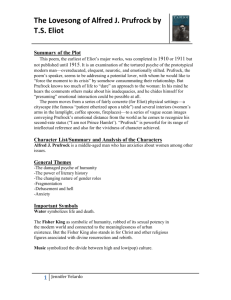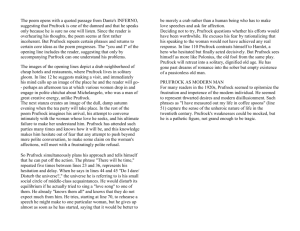file - Athens Academy
advertisement
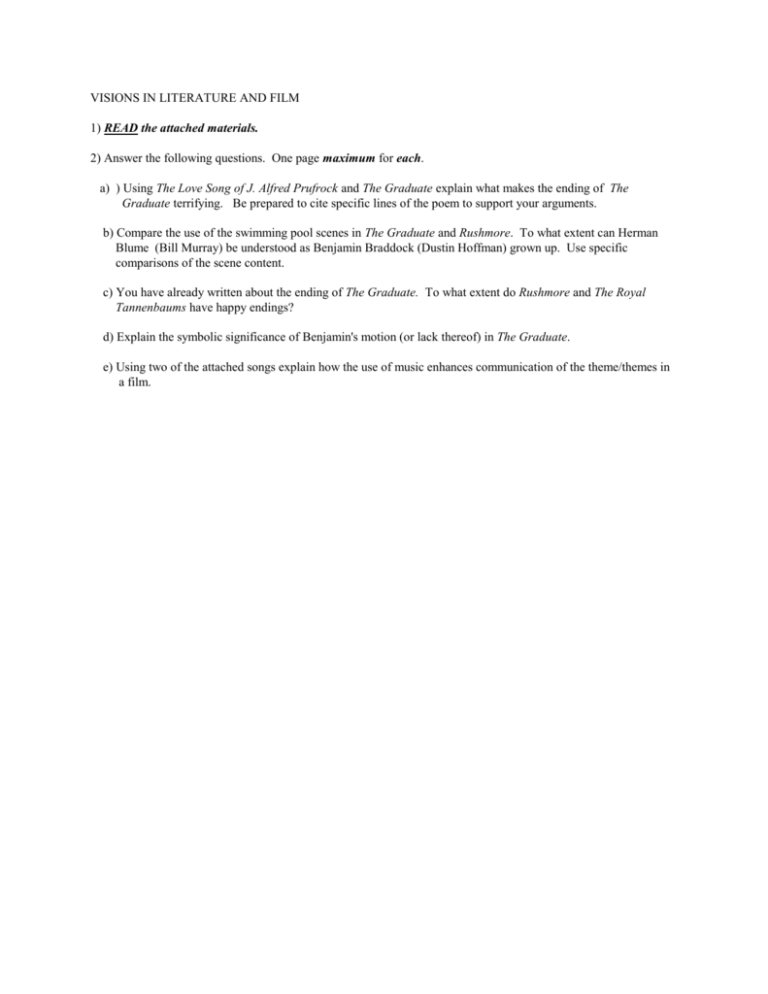
VISIONS IN LITERATURE AND FILM 1) READ the attached materials. 2) Answer the following questions. One page maximum for each. a) ) Using The Love Song of J. Alfred Prufrock and The Graduate explain what makes the ending of The Graduate terrifying. Be prepared to cite specific lines of the poem to support your arguments. b) Compare the use of the swimming pool scenes in The Graduate and Rushmore. To what extent can Herman Blume (Bill Murray) be understood as Benjamin Braddock (Dustin Hoffman) grown up. Use specific comparisons of the scene content. c) You have already written about the ending of The Graduate. To what extent do Rushmore and The Royal Tannenbaums have happy endings? d) Explain the symbolic significance of Benjamin's motion (or lack thereof) in The Graduate. e) Using two of the attached songs explain how the use of music enhances communication of the theme/themes in a film. T. S. Eliot: The Love Song of J. Alfred Prufrock (1919) Eliot was born in St. Louis and educated at Harvard University, but most of his adult life was passed in London. In the vanguard of the artistic movement known as Modernism, Eliot was a unique innovator in poetry and The Waste Land (1922) stands as one of the most original and influential poems of the twentieth century. As a young man he suffered a religious crisis and a nervous breakdown before regaining his emotional equilibrium and Christian faith. His early poetry, including "Prufrock," deals with spiritually exhausted people who exist in the impersonal modern city. Prufrock is a representative character who cannot reconcile his thoughts and understanding with his feelings and will. The poem displays several levels of irony, the most important of which grows out of the vain, weak man's insights into his sterile life and his lack of will to change that life. The poem is replete with images of enervation and paralysis, such as the evening described as "etherized," immobile. Prufrock understands that he and his associates lack authenticity. One part of himself would like to startle them out of their meaningless lives, but to accomplish this he would have to risk disturbing his "universe," being rejected. The latter part of the poem captures his sense defeat for failing to act courageously. Eliot helped to set the modernist fashion for blending references to the classics with the most sordid type of realism, then expressing the blend in majestic language which seems to mock the subject. S'io credesse che mia risposta fosse A persona che mai tornasse al mondo, Questa fiamma staria senza piu scosse. Ma perciocche giammai di questo fondo Non torno vivo alcun, s'i'odo il vero, Senza tema d'infamia ti rispondo. 1 Let us go then, you and I, When the evening is spread out against the sky Like a patient etherized2 upon a table; Let us go, through certain half-deserted streets, The muttering retreats Of restless nights in one-night cheap hotels And sawdust3 restaurants with oyster-shells: Streets that follow like a tedious argument Of insidious intent To lead you to an overwhelming question . . . Oh, do not ask, "What is it?" Let us go and make our visit. In the room the women come and go Talking of Michelangelo.4 The yellow fog that rubs its back upon the window-panes, The yellow smoke that rubs its muzzle on the window-panes Licked its tongue into the corners of the evening, Lingered upon the pools that stand in drains, Let fall upon its back the soot that falls from chimneys, Slipped by the terrace, made a sudden leap, And seeing that it was a soft October night, Curled once about the house, and fell asleep. And indeed there will be time For the yellow smoke that slides along the street, Rubbing its back upon the window-panes; There will be time, there will be time To prepare a face to meet the faces that you meet; There will be time to murder and create, And time for all the works and days of hands That lift and drop a question on your plate; Time for you and time for me, And time yet for a hundred indecisions, And for a hundred visions and revisions, Before the taking of a toast and tea. In the room the women come and go Talking of Michelangelo. And indeed there will be time To wonder, "Do I dare?" and, "Do I dare?" Time to turn back and descend the stair, With a bald spot in the middle of my hair-[They will say: "How his hair is growing thin!"] My morning coat, my collar mounting firmly to the chin, My necktie rich and modest, but asserted by a simple pin-[They will say: "But how his arms and legs are thin!"] Do I dare Disturb the universe? In a minute there is time For decisions and revisions which a minute will reverse. For I have known them all already, known them all:-Have known the evenings, mornings, afternoons, I have measured out my life with coffee spoons; I know the voices dying with a dying fall Beneath the music from a farther room. So how should I presume? And I have known the eyes already, known them all-The eyes that fix you in a formulated phrase, And when I am formulated, sprawling on a pin, When I am pinned and wriggling on the wall, Then how should I begin To spit out all the butt-ends of my days and ways? And how should I presume? And I have known the arms already, known them all-Arms that are braceleted and white and bare [But in the lamplight, downed with light brown hair!] Is it perfume from a dress That makes me so digress? Arms that lie along a table, or wrap about a shawl. And should I then presume? And how should I begin? ..... Shall I say, I have gone at dusk through narrow streets And watched the smoke that rises from the pipes Of lonely men in shirt-sleeves, leaning out of windows? . . . I should have been a pair of ragged claws Scuttling across the floors of silent seas. ..... And the afternoon, the evening, sleeps so peacefully! Smoothed by long fingers, Asleep . . . tired . . . or it malingers, Stretched on the floor, here beside you and me. Should I, after tea and cakes and ices,5 Have the strength to force the moment to its crisis? But though I have wept and fasted, wept and prayed, Though I have seen my head [grown slightly bald] brought in upon a platter,6 I am no prophet--and here's no great matter; I have seen the moment of my greatness flicker, And I have seen the eternal Footman hold my coat, and snicker, And in short, I was afraid. And would it have been worth it, after all, After the cups, the marmalade, the tea, Among the porcelain, among some talk of you and me, Would it have been worth while, To have bitten off the matter with a smile, To have squeezed the universe into a ball To roll it toward some overwhelming question, To say: "I am Lazarus,7 come from the dead Come back to tell you all, I shall tell you all"-If one, settling a pillow by her head, Should say: "That is not what I meant at all. That is not it, at all." And would it have been worth it, after all, Would it have been worth while, After the sunsets and the dooryards and the sprinkled streets, After the novels, after the teacups, after the skirts that trail along the floor-And this, and so much more?-It is impossible to say just what I mean! But as if a magic lantern8 threw the nerves in patterns on a screen: Would it have been worth while If one, settling a pillow or throwing off a shawl, And turning toward the window, should say: "That is not it at all, That is not what I meant, at all." ..... No! I am not Prince Hamlet,9 nor was meant to be; Am an attendant lord, one that will do To swell a progress, start a scene or two, Advise the prince; no doubt, an easy tool, Deferential, glad to be of use, Politic, cautious, and meticulous; Full of high sentence, but a bit obtuse At times, indeed, almost ridiculous-Almost, at times, the Fool. I grow old . . .I grow old . . . I shall wear the bottoms of my trousers rolled. Shall I part my hair behind? Do I dare to eat a peach? I shall wear white flannel trousers, and walk upon the beach. I have heard the mermaids singing, each to each. I do not think that they will sing to me. I have seen them riding seaward on the waves Combing the white hair of the waves blown back When the wind blows the water white and black. We have lingered in the chambers of the sea By sea-girls wreathed with seaweed red and brown Till human voices wake us, and we drown. 1 A passage from Dante Alighieri's Inferno (Canto 27, lines 61-66) spoken by Guido da Montefeltro in response to the questions of Dante, who Guido supposes is dead, since he is in Hell:. The flame in which Guido is encased vibrates as he speaks: "If I thought that that I was replying to someone who would ever return to the world, this flame would cease to flicker. But since no one ever returns from these depths alive, if what I've heard is true, I will answer you without fear of infamy." 2 Anesthetized with ether; but also suggesting "made etherial," less real. 3 Cheap bars and restaurants used to spread sawdust on the floor to soak up spilled beer, etc. 4 The great Renaissance Italian artist. 5 Cookies and ice cream. 6 Like John the Baptist (see Matthew 14: 1-12) 7 A man raised from death by Jesus (see John 11: 1-44). 8 Early form of slide projector. 9 Shakespeare's sensitive hero known for procrastination. Sounds of Silence by: Simon and Garfunkel Hello darkness, my old friend I've come to talk with you again Because a vision softly creeping Left its seeds while I was sleeping And the vision that was planted in my brain Still remains Within the sound of silence In restless dreams I walked alone Narrow streets of cobblestone 'Neath the halo of a street lamp I turned my collar to the cold and damp When my eyes were stabbed by the flash of a neon light That split the night And touched the sound of silence And in the naked light I saw Ten thousand people, maybe more People talking without speaking People hearing without listening People writing songs that voices never share And no one dared Disturb the sound of silence "Fools", said I, "You do not know Silence like a cancer grows Hear my words that I might teach you Take my arms that I might reach you" But my words, like silent raindrops fell And echoed In the wells of silence And the people bowed and prayed To the neon god they made And the sign flashed out its warning In the words that it was forming And the sign said, "The words of the prophets are written on the subway walls And tenement halls" And whispered in the sounds of silence Everyone by Van Morrison We shall walk again Down along the lane Down the avenue Just like we used to do With our heads so high Smile at the passers by Then we’ll softly sigh Ay, Ay, Ay, Ay, Ay Chorus: Everyone, everyone, everyone, everyone Everyone, everyone, everyone, everyone By the winding stream We shall lie and dream We’ll make dreams come true If we want them to Yes all will come play The pipes and drum Sing a happy song And we’ll sing along Chorus Everyone, everyone, everyone, everyone Everyone, everyone, everyone, everyone We shall walk again Down along the lane Down the avenue Just like we used to do With our heads so high Smile at the passers by Then we’ll softly sigh Ay, Ay, Ay, Ay, Ay Ooh La La by Ronnie Lane and Ron Wood Poor old granddad I laughed at all his words I thought he was a bitter man He spoke of women’s ways Theyll trap you, then they use you Before you even know For love is blind and you’re far too kind Don’t ever let it show I wish that I knew what I know now When I was younger. I wish that I knew what I know now When I was stronger. The can-cans such a pretty show They’ll steal your heart away But backstage, back on earth again The dressing rooms are grey They come on strong and it ain’t too long Before they make you feel a man But love is blind and you soon will find You’re just a boy again When you want her lips, you get a cheek Makes you wonder where you are If you want some more and shes fast asleep Leaves you twinkling with the stars. Poor young grandson, there’s nothing I can say You’ll have to learn, just like me And that’s the hardest way Ooh la la I wish that I knew what I know now When I was younger. I wish that I knew what I know now When I was stronger.
